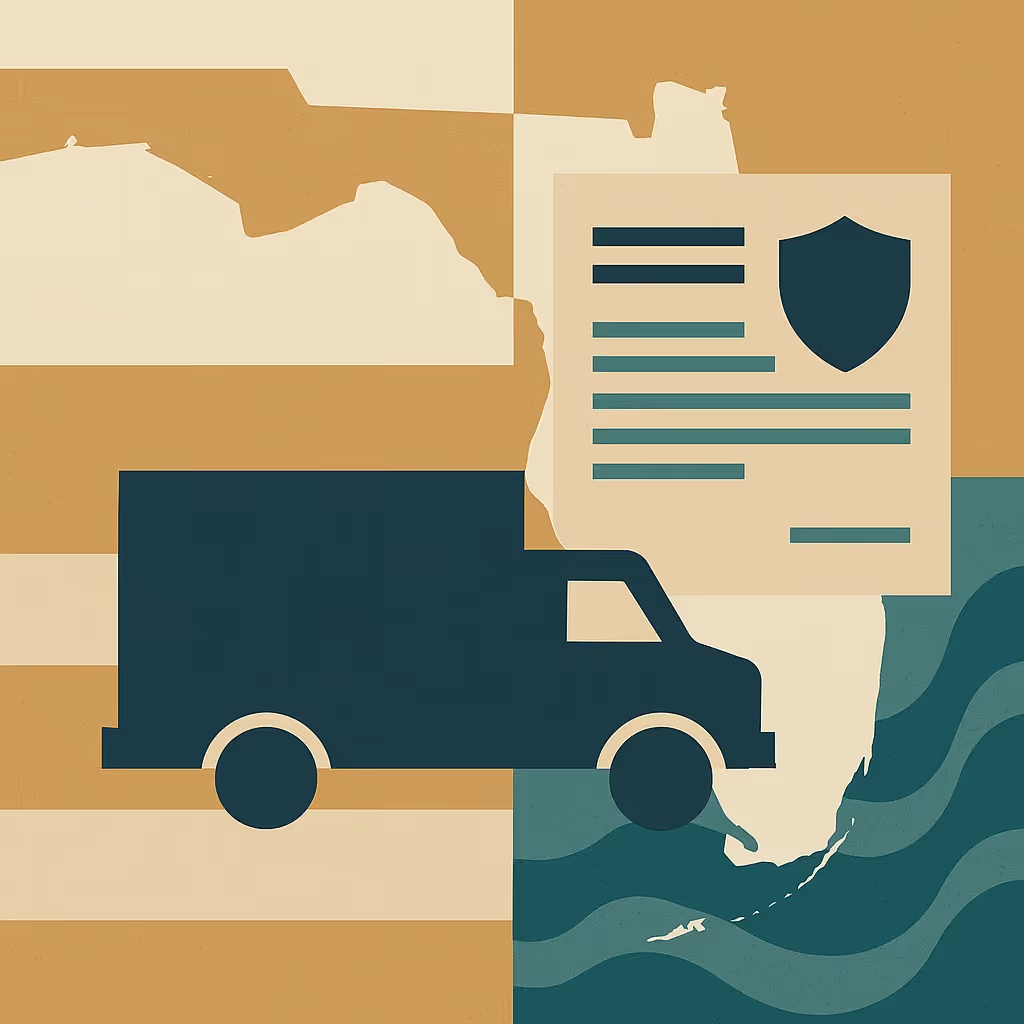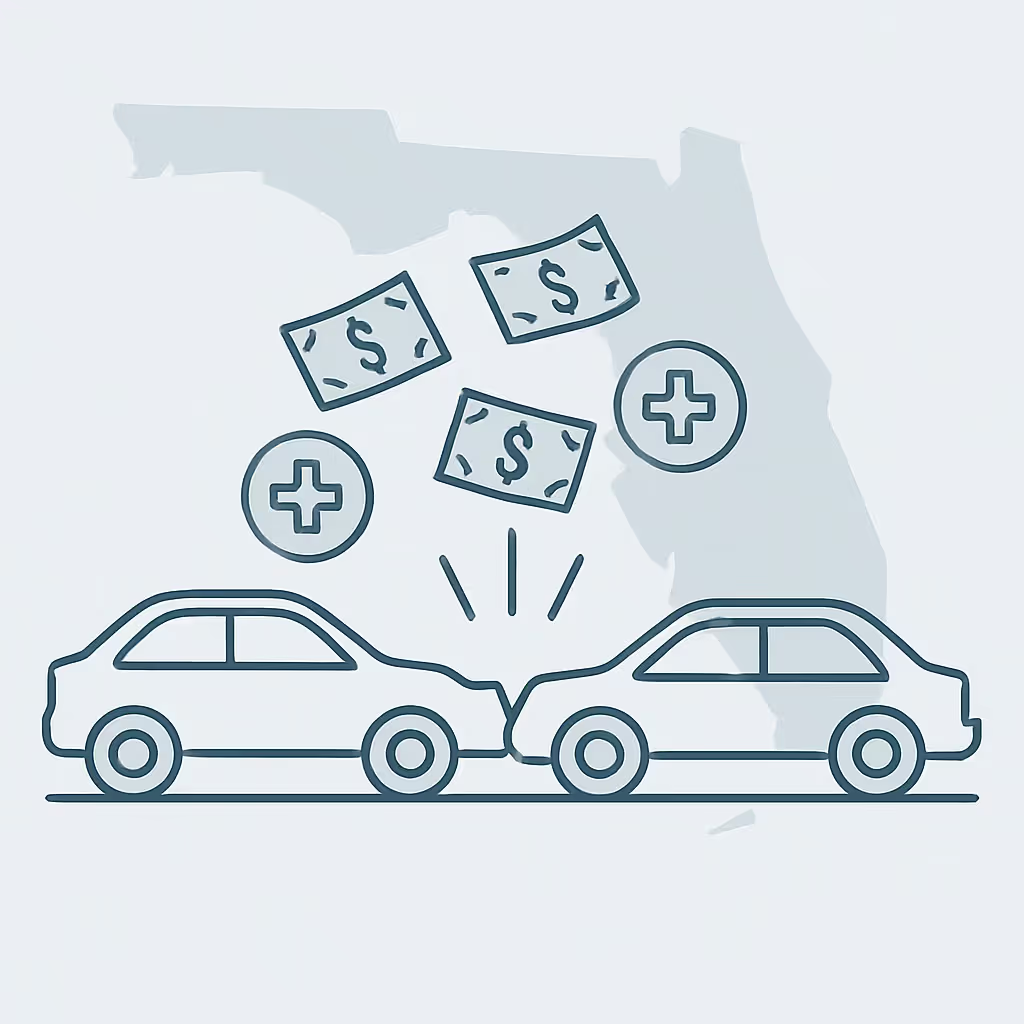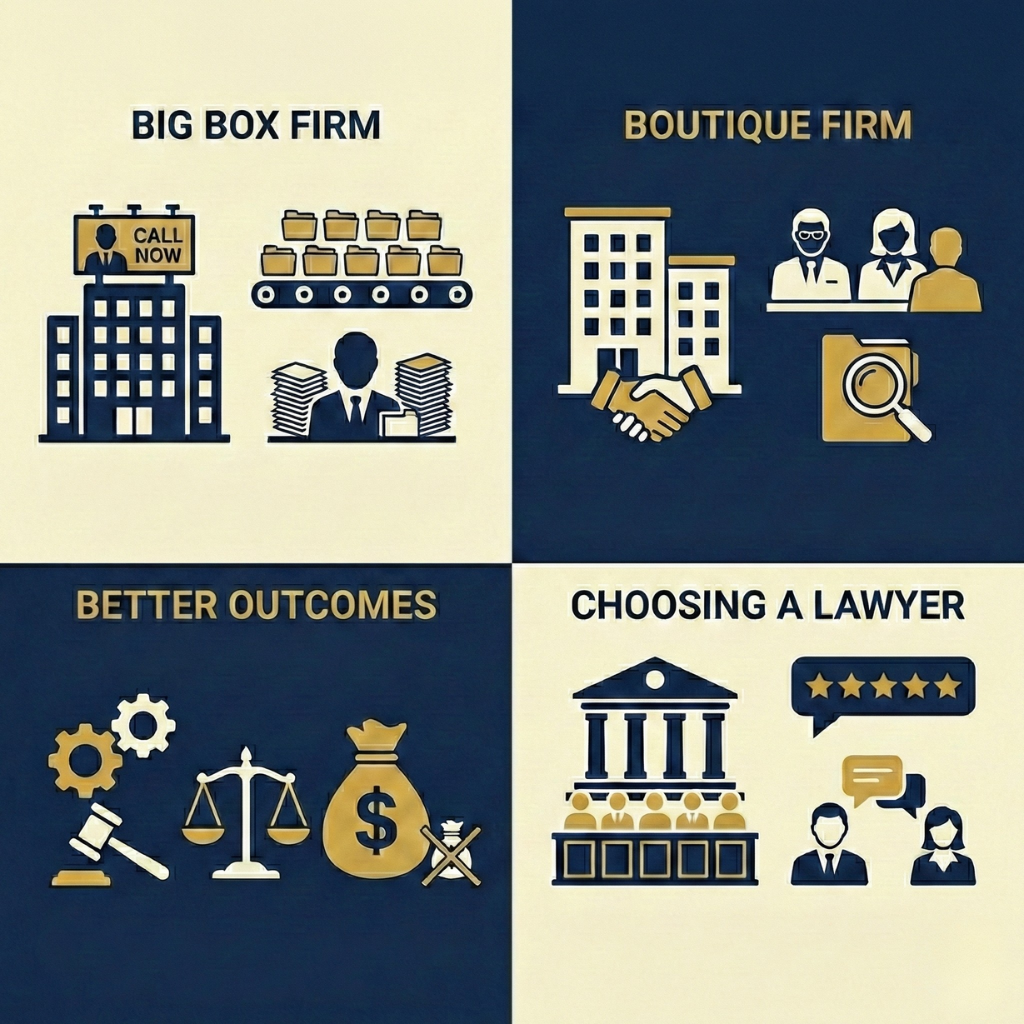Does Florida Require Car Insurance? A Complete Guide for Melbourne Drivers
Yes, Florida requires minimum car insurance. Learn about PIP & PDL requirements, penalties for driving uninsured, & 2025 changes for Melbourne drivers.
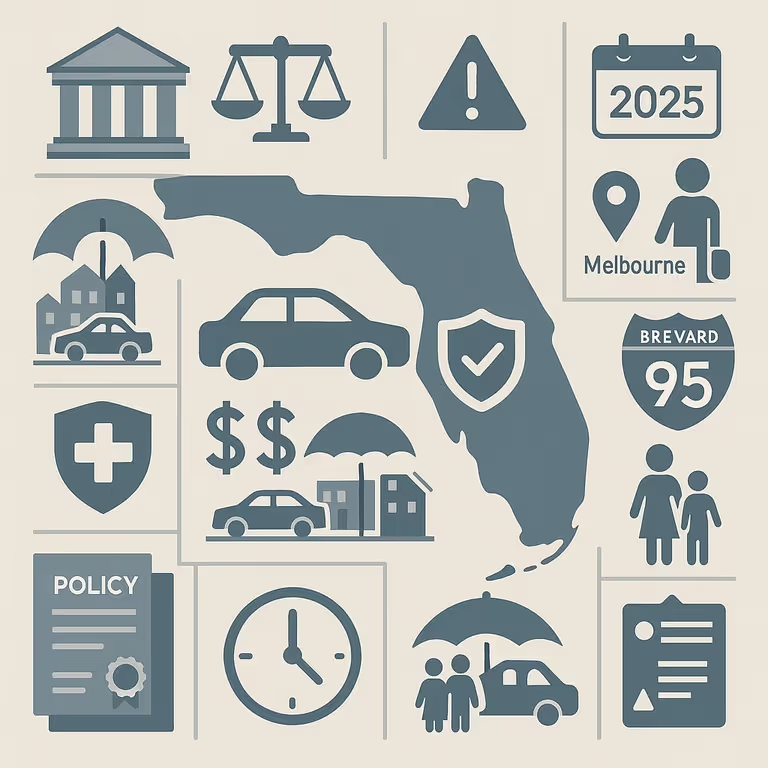
- Florida mandates $10,000 PIP and $10,000 PDL coverage for all registered vehicles, regardless of driving frequency.
- Driving without insurance triggers license suspension for up to 3 years plus fines and reinstatement fees.
- The 2025 legislative attempt to eliminate PIP requirements failed, keeping current no-fault system intact.
Worried About Your Injury Case? We'll Review It - Free!


Yes, Florida Requires Car Insurance – Here's What You Need to Know
If you're driving in Florida, the answer is a definitive yes. The state requires all vehicle owners to carry minimum insurance coverage. Florida law mandates two specific types of insurance: Personal Injury Protection (PIP) and Property Damage Liability (PDL). These requirements exist to ensure drivers can cover their own medical expenses after an accident and protect others from property damage they might cause.
With recent legislative debates threatening to change these requirements entirely, understanding your current obligations is more critical than ever. The 2025 legislative session featured significant discussions about eliminating Florida's no-fault insurance system, though these proposed changes ultimately did not pass. However, this ongoing uncertainty makes it essential for Florida drivers to understand both the current law and the potential for future changes.
At Doug Beam's Melbourne law firm, we've been helping Brevard County residents navigate insurance-related injury claims for over 35 years. With more than $1 billion in verdicts and settlements secured for our clients, we understand firsthand how crucial proper insurance coverage is for protecting your family and your financial future.
This guide will walk you through everything you need to know about Florida's car insurance requirements, from the specific coverage types mandated by law to the serious consequences of driving without insurance. We'll also explore the recent legislative developments that could affect your coverage and provide practical insights for Melbourne and Brevard County drivers.
Need help with a car accident claim or insurance dispute? Contact our Melbourne personal injury team at (321) 723-6591 for a free consultation. Every case is different, and outcomes vary significantly based on specific circumstances.

Mandatory PIP and Property Damage Liability Coverage
Understanding Florida's mandatory insurance requirements is straightforward once you know the two essential coverage types every driver must carry. These requirements form the foundation of Florida's no-fault insurance system, which aims to ensure accident victims receive prompt medical care regardless of who caused the crash.
Personal Injury Protection (PIP) - Your Medical Safety Net
Personal Injury Protection, commonly called PIP, is the cornerstone of Florida's insurance law. Every Florida driver must carry a minimum of $10,000 in PIP coverage. This insurance serves as your immediate medical safety net after any accident, covering 80 percent of necessary and reasonable medical expenses up to your policy limit.
PIP coverage extends beyond just medical bills. It also provides benefits for lost wages (typically 60 percent of your lost income), essential services you can't perform due to injury, and even death benefits for surviving family members. The key advantage of PIP is that it works regardless of who caused the accident. Your insurance pays these benefits first, allowing you to get immediate medical treatment without waiting for fault determinations or lengthy insurance negotiations.
This coverage applies not only to you as the driver but also to family members living in your household and passengers in your vehicle. If you're injured as a pedestrian in an accident involving your own vehicle, PIP coverage typically applies as well.
Property Damage Liability (PDL) - Protecting Others' Property
The second mandatory coverage is Property Damage Liability, which requires a minimum of $10,000 in coverage. This insurance protects other people's property when you're responsible for an accident. PDL covers damage to other vehicles, structures like buildings or fences, and personal property damaged in crashes you cause.
It's crucial to understand that PDL does not cover damage to your own vehicle – it only covers property damage you cause to others. Many drivers find that the $10,000 minimum may not provide adequate protection given today's vehicle values. A minor fender-bender involving a luxury vehicle or multiple cars can easily exceed this limit, leaving you personally responsible for the difference.
Important note: Unlike most states, Florida does not require bodily injury liability coverage. However, this can leave you financially vulnerable if you cause serious injuries in an accident. Many car accident cases we handle in Melbourne involve drivers who discovered too late that their minimum coverage wasn't sufficient to protect their assets.

Penalties for Driving Without Insurance in Florida
Driving without the required insurance coverage in Florida carries serious legal and financial consequences that can affect your life for years. The state takes insurance violations seriously and has implemented strict penalties to encourage compliance with the mandatory coverage laws.
Immediate Legal Consequences
If you're caught driving without valid PIP and PDL coverage, Florida law imposes harsh penalties. Your driver's license will be suspended for up to three years, and you'll need to pay a $150 reinstatement fee plus provide proof of insurance before you can legally drive again. Law enforcement can also impound your vehicle, adding towing and storage costs to your mounting expenses.
You may face additional fines and court costs, depending on your county and the specific circumstances of your violation. Many drivers don't realize that even letting your insurance lapse for a single day can trigger these penalties if you're stopped or involved in an accident during that period.
Financial Risks of Being Uninsured
Beyond the immediate legal penalties, driving without insurance exposes you to potentially devastating financial consequences. Without PIP coverage, you have no protection for your own medical expenses, regardless of who caused an accident. A single emergency room visit can cost thousands of dollars, and surgery or extended rehabilitation can reach six-figure bills.
Without PDL coverage, you're personally liable for all property damage you cause to others. This liability extends to vehicle repairs, damaged property, rental car expenses, and even lost wages if your accident affects someone's ability to work. These costs can quickly escalate beyond what most people can afford to pay out of pocket.
Additionally, if you're injured by another driver and lack insurance, you may find yourself ineligible for certain benefits and facing higher hurdles in pursuing compensation through the legal system.
Special Rules for Vehicle Registration
Florida ties insurance requirements directly to vehicle registration. You cannot register a vehicle in the state without first providing proof of both PIP and PDL coverage to the Department of Highway Safety and Motor Vehicles. This insurance must be maintained continuously while your vehicle remains registered – allowing coverage to lapse can trigger automatic violations even if you're not actively driving.
Local Context in Melbourne and Brevard County
Brevard County law enforcement actively monitors and enforces insurance requirements. Our Melbourne car accident lawyers regularly see cases where uninsured drivers face not only the legal penalties but also struggle to obtain fair compensation for their injuries due to their insurance violations.
In our experience handling thousands of cases throughout Central Florida over nearly four decades, we've witnessed the financial devastation uninsured accidents can cause families. With our firm's track record of over $1 billion in case results, we've seen how proper insurance coverage can mean the difference between financial recovery and financial ruin after a serious accident.

2025 Legislative Changes and No-Fault System Debates
The 2025 Florida legislative session brought unprecedented attention to the state's car insurance requirements, with lawmakers seriously considering the most significant changes to the system in decades. Understanding these developments helps you prepare for potential future changes while navigating the current legal landscape.
The Failed Attempt to Eliminate Florida's No-Fault System
House Bill 1181, introduced during the 2025 legislative session, proposed sweeping changes that would have completely transformed Florida's car insurance landscape. The bill sought to eliminate the state's long-standing Personal Injury Protection (PIP) requirement and dismantle the no-fault insurance system that has been in place for decades.
Under the proposed legislation, Florida would have joined most other states in requiring bodily injury liability coverage instead of PIP. This fundamental shift would have changed how accident victims receive compensation, moving from the current system where your own insurance pays first to a traditional fault-based system where the at-fault driver's insurance would be the primary source of compensation.
However, the bill faced significant opposition, including from Governor Ron DeSantis, who publicly opposed repealing Florida's no-fault system. The Governor had previously vetoed similar legislation, expressing concerns about how such changes would affect accident victims and insurance costs statewide.
What This Means for Current Insurance Requirements
Despite the legislative attention and debate, House Bill 1181 did not pass during the 2025 session. This means all current insurance requirements remain fully in effect with no changes to minimum coverage amounts or the structure of Florida's no-fault system. Drivers must still maintain $10,000 in PIP coverage and $10,000 in Property Damage Liability coverage.
The no-fault system continues to operate as designed, with your PIP insurance providing immediate medical benefits regardless of who caused an accident. The claims process, coverage requirements, and legal framework remain unchanged from previous years.
Why This Debate Matters for Florida Drivers
Although the 2025 legislative efforts were unsuccessful, the serious consideration given to eliminating PIP coverage signals that future legislative sessions may revisit these proposals. The ongoing debate highlights several important considerations for Florida drivers:
Insurance premiums could be significantly affected by any future changes to the system. The shift from PIP to bodily injury liability coverage would likely alter how insurance companies calculate rates and could impact what drivers ultimately pay for coverage.
The claims process would fundamentally change under a fault-based system. Instead of your own insurance providing immediate medical coverage, you would need to pursue compensation from the at-fault driver's insurance company, potentially creating delays in medical care and payment.
Our firm's position: As attorneys who have represented thousands of injury victims over nearly four decades, we believe that whatever insurance system provides the best protection for injured people should be maintained. Every case is different, and outcomes vary significantly, but our experience has shown that prompt medical care and compensation are crucial for injury recovery.
For current and future developments in Florida's insurance laws, we recommend staying informed through reliable legal resources, including our related article on Florida's no-fault insurance system.

Melbourne and Brevard County Specific Considerations
While Florida's car insurance requirements apply uniformly across the state, Melbourne and Brevard County drivers face unique circumstances that make understanding these requirements even more important. Local traffic patterns, tourism factors, and geographic considerations all influence how insurance coverage affects drivers in our area.
Local Insurance Requirements and Challenges
All Brevard County residents must comply with the same statewide requirements for PIP and Property Damage Liability coverage. However, our area's characteristics create specific situations where adequate insurance becomes particularly crucial.
The Space Coast's tourist-heavy areas, including Cocoa Beach and Melbourne Beach, see significantly higher traffic volumes during peak seasons and events. These congested conditions increase accident risks and highlight the importance of having sufficient coverage not just for your own protection, but for the tourists and out-of-state visitors who may have different insurance coverage levels.
Common Insurance Issues in Our Area
Several factors make insurance disputes and coverage questions particularly common in Central Florida. The I-95 corridor that runs through our area sees frequent accidents involving drivers from multiple states, each with different insurance requirements and coverage levels. These situations often create complex questions about which state's laws apply and how different insurance policies interact.
Tourist-related accidents present unique challenges since visitors may have out-of-state insurance policies that don't provide PIP coverage or may have rental car insurance that creates coverage gaps. Understanding how your insurance works with other policies becomes crucial in these situations.
Hurricane season brings additional complications when vehicles are damaged by storms. While comprehensive coverage handles weather-related damage, many drivers don't realize that PIP and Property Damage Liability requirements continue even when their vehicle is being repaired or replaced after storm damage.
Local Legal Resources and Advantages
Brevard County operates under the 18th Judicial Circuit Court system for insurance-related litigation and disputes. Local attorneys familiar with this court system and local judges can provide advantages when insurance companies deny valid claims or disputes arise about coverage levels.
Our Melbourne firm brings particular advantages to insurance-related injury cases. Doug Beam has been handling insurance disputes and injury claims in Melbourne since 1988, accumulating nearly four decades of experience with local insurance companies, medical providers, and court procedures. This experience includes thousands of cases and some of the largest verdicts in Florida history, including our recent $28.5 million brain injury verdict right here in Melbourne.
When to Contact a Local Attorney
Several situations warrant consulting with experienced Melbourne personal injury attorneys about your insurance coverage or claims:
If your insurance company denies a valid PIP claim or unreasonably delays payment for medical expenses, legal intervention may be necessary to ensure you receive the benefits you've paid for through your premiums.
When injuries exceed your PIP limits in serious accidents, you may need to explore additional compensation sources, including uninsured motorist coverage, the at-fault driver's insurance, or legal action against responsible parties.
Uninsured motorist accidents create particularly complex situations where multiple coverage sources and legal strategies may apply. Our experience with these cases throughout Brevard County helps ensure you don't miss potential sources of compensation.
Common Questions About Florida Car Insurance Laws
Understanding Florida's car insurance requirements often raises specific questions about how these laws apply to individual situations. Here are answers to the most common questions we receive from Melbourne and Central Florida residents about their insurance obligations and rights.
Do I need car insurance if I don't drive regularly?
Yes, if your vehicle is registered in Florida, you must maintain continuous PIP and Property Damage Liability coverage regardless of how often you drive. The requirement is tied to vehicle registration, not usage frequency. Even if your car sits in your driveway most of the time, Florida law requires active insurance coverage as long as the vehicle has valid registration. Allowing coverage to lapse, even briefly, can trigger license suspension and fees.
What if I let my insurance lapse accidentally?
Contact your insurance company immediately to reinstate coverage. If you've already been cited for driving without insurance or had an accident during the lapse period, you may face license suspension and will need to pay reinstatement fees before driving legally again. The $150 reinstatement fee plus proof of insurance are required to restore your driving privileges. Some insurance companies offer grace periods, but don't rely on these. Maintain continuous coverage to avoid complications.
Can I use out-of-state insurance in Florida?
Yes, but your policy must meet Florida's minimum requirements for PIP and Property Damage Liability coverage. Many out-of-state insurance policies don't include PIP coverage since most states don't require it. If your current policy lacks the required PIP coverage, you'll need to add it or purchase a Florida-compliant policy before registering your vehicle in the state.
Is motorcycle insurance different from car insurance in Florida?
Motorcycles have different requirements under Florida law. Riders over 21 who carry at least $10,000 in medical insurance are exempt from PIP requirements, but they still need property damage liability coverage. However, younger riders and those without adequate medical insurance must carry PIP. Given the increased injury risks associated with motorcycle accidents, many riders choose additional coverage. Our motorcycle accident lawyers often work with clients who discover their coverage was insufficient after serious accidents.
What happens if the other driver doesn't have insurance?
This situation highlights why uninsured motorist coverage is highly recommended, though not required in Florida. Your PIP coverage will still pay for your initial medical expenses regardless of the other driver's insurance status. However, property damage to your vehicle and additional injury costs beyond your PIP limits may require legal action against the uninsured driver or claims against your own coverage if you have uninsured motorist protection.
How do I know if I have enough coverage?
Consider your assets, income, and potential exposure when evaluating coverage levels. Florida's minimum requirements may not provide adequate protection for serious accidents involving significant property damage or injuries. Review your coverage annually and consider factors like your home equity, savings, and income that could be at risk in a major accident. For guidance on protecting yourself after an accident, read our article about what to do after a car accident.
Florida's car insurance requirements provide a foundation of protection, but understanding your coverage and rights becomes crucial when accidents happen – especially as legislative debates continue to shape the future of the state's no-fault system. With decades of experience handling insurance disputes and injury claims in Melbourne and throughout Central Florida, we've seen how proper preparation and knowledge can make the difference between a manageable situation and a financial catastrophe. Every case is different, and outcomes vary significantly based on specific circumstances.
Need help with a car accident claim or insurance dispute? Contact Doug Beam's Melbourne law firm at (321) 723-6591 for a free consultation. With over 35 years of experience and more than $1 billion in case results, we're here to protect your rights.
Sources and Further Reading
- Florida Insurance Requirements – FLHSMV Official Site
- Personal Injury Protection Consumer Information – The Florida Bar
- Florida Statute 627.736 - Motor Vehicle No-Fault Law Text
- House Bill 1181 Legislative Analysis – Florida Senate
- DeSantis Opposes PIP Repeal – Florida Phoenix
- 2025 Legislative Session Outcomes – Florida Phoenix
- Brevard County Legal Jurisdiction Information
This article provides general information and is not a substitute for legal advice. Laws can change, and the details of your situation matter. For personalized guidance, please contact a qualified Florida personal injury attorney.
Not Sure What To Do Next? We Can Help – Fast & Free.
Worried About Your Injury Case?
We'll Review It - Free
Don’t miss an article
Florida law, local insights, and the occasional dog pic.
Delivered straight to your inbox.
More articles
Browse all articlesFree Case Review
Get a complimentary review of your case

.webp)
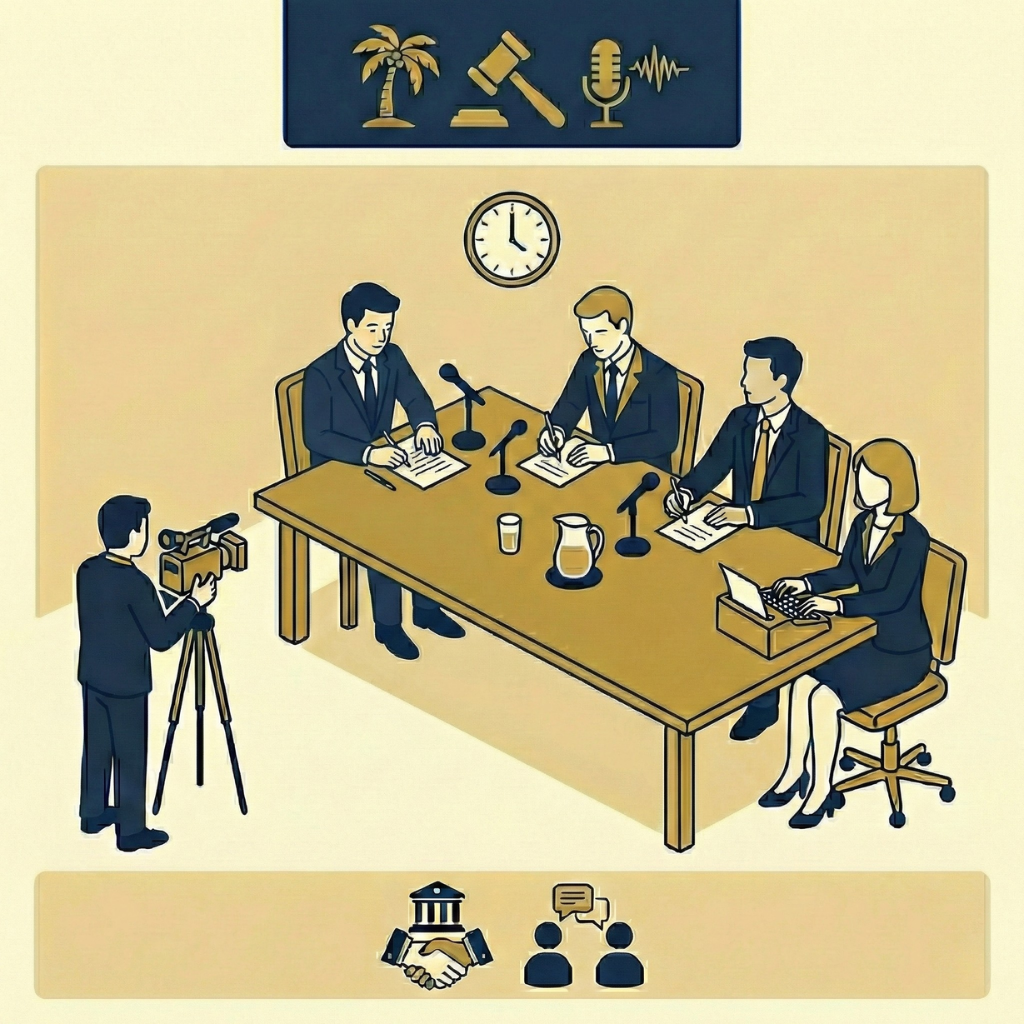
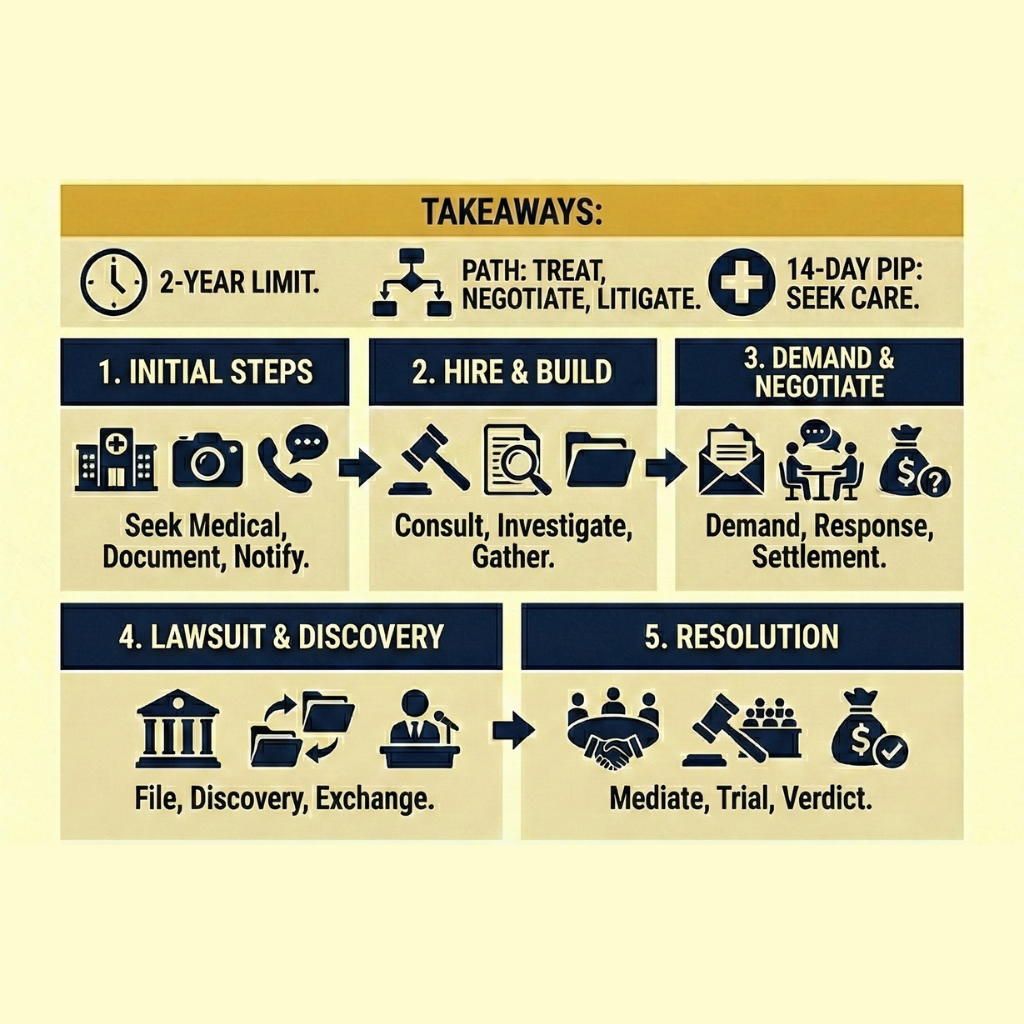



.png)
